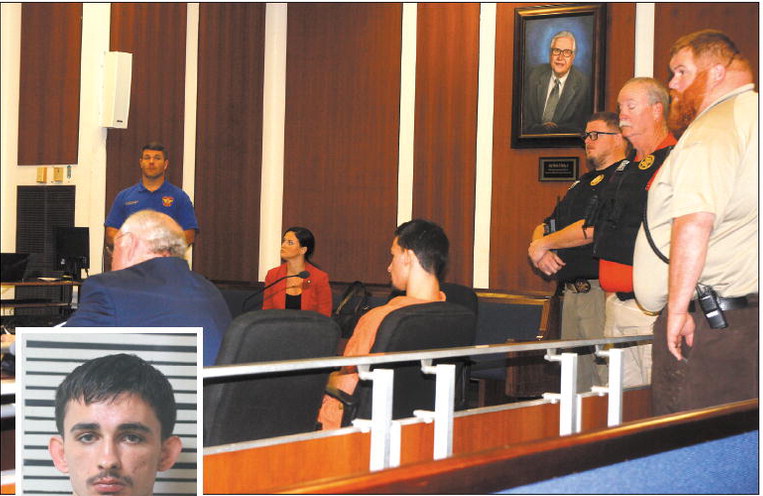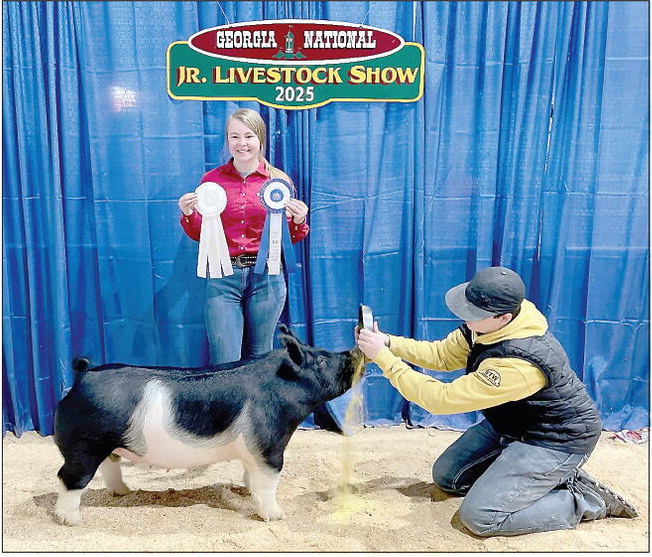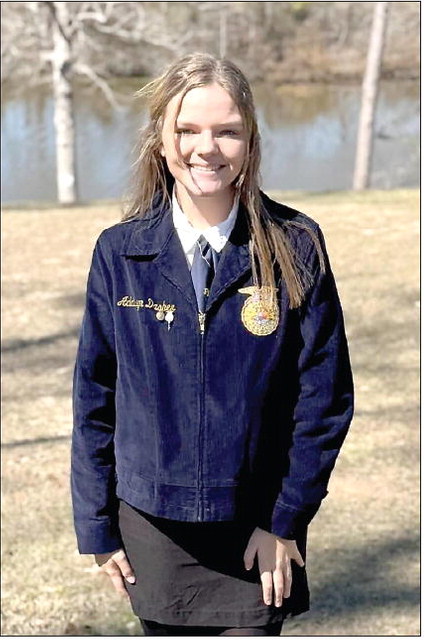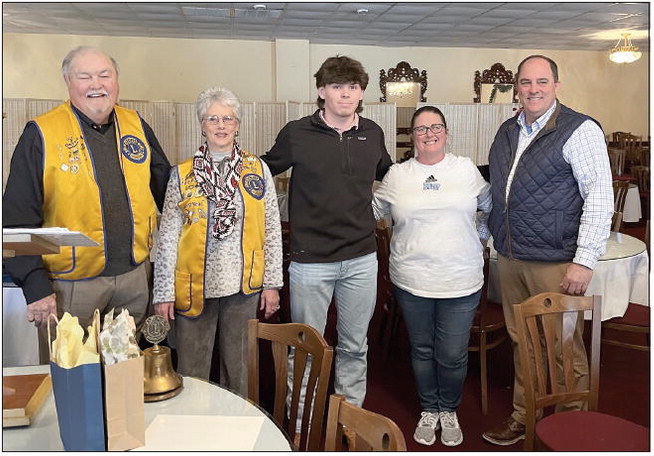Leadership Wheeler Academy Graduates Honored
Graduates of the Wheeler Academy 2022 were honored April 14 following the completion of the 2021-2022 adult and youth programs. The graduation ceremony was held at the Wheeler County Middle/High School and guest speakers were education professional Christy Clark Wray and Dr. Matt Bishop, representing the J.W. Fanning Institute for Leadership Development.
Wray, who is a graduate of Wheeler County High School, shared with attendees that she came from a family of educators; in fact, it was her grandfather, William S. Clark, who helped to build the Wheeler County Middle/ High School. That structure is soon to be replaced by the next generation of educational facilities as the state-of-the-art Wheeler County School, which will house all grades under one roof, is due to be opened next fall. Wray focused on the youth in the audience when she remarked, “Fifty percent of the jobs that you are about to step into as high school seniors did not exist 10 years ago. Think back to when you were a kindergartener and wondered about what you would become one day… a teacher, an engineer, a professional athlete? I’ll bet none of you thought about a career in instructional technology. When you were in kindergarten, that term was not in our vocabulary. Or what about a social media influencer who is paid to post Tik-Toks? That is a real career and people are making money at it. “The question is: what do we a educators do to prepare our students to be the most productive, successful citizens they can be, so that they can contribute to their community, have the skills necessary to be good parents, and to give back. My answer to that is work ethics. Strong work ethics and well-developed thought skills can enable everyone to reach their maximum potential.” She noted that a high school graduate’s route to success might be a fouryear college, a technical college, going into the military, or on-the-job training with a direct line into the work force. “Whatever it is, you have to be passionate about it. But, what if you haven’t figured out what you want?” She quipped, “One of my favorite sayings is ‘You don’t know what you don’t know.’ ” Because her favorite subject in school was math she thought she was bound for a career in civil engineering, but once she had the opportunity for some on-thejob- experience supervising road construction, she decided that was not her career path, after all. She decided instead to change her major and to channel her passion for math into classroom instruction.
During her career, Wray has been a high school math teach, an academic math coach, a district curriculum director, and assistant superintendent of instruction for the Mitchell County School System. Additionally, she has been active in her community as an executive officer in the Camilla Chamber of Commerce and as the current president of Camilla Lions Club. She also holds district and state positions in the Lions organization.
“Being here tonight is a full circle moment for me,” she said of her connection with Wheeler County and its school system. She noted that her grandfather became school superintendent in 1964 and served in that capacity for 20 years. The vocational building, fine arts building, the bus shop and the gym, were built during his tenure. “He even used his own tractor to clear the football field.”
The daughter of Cary and Marion Clark, both educators, and the niece of Ronny Clark, also a former superintendent of Wheeler County Schools, Wray referenced the deep commitment her family has to education, to the community, and to family. “We supported local business, and each other, and were members of clubs and organizations here.”
She mentioned a quote by Winston Churchill: “We make a living by what we get; we make a life by what we give.” In closing, she issued a challenge to the program graduates to strengthen their own work ethics, fine-tune their skills, and to search for areas in line with their interests and goals to gain exposure. “I challenge you to discover your passion and let it drive you to make amazing things happen not only in Wheeler County, but wherever your steps may take you.”
Dr. Matthew Bishop, as the Director of the Fanning Institute at the University of Georgia, has worked across the state to accomplish the mission of strengthening communities, organizations and individuals through leadership development, education and training. It was the Institute, with a $20,000 grant to the Wheeler Adult Leadership Program, that made such objectives possible locally. With a team of 35 made up of faculty, staff and students, the Institute designs and delivers a variety of leadership programs that further community, nonprofit and youth audiences. Each community receives a customized program to fit its unique situation.
In addition to his work with the Institute, Bishop served as chair of Leadership Georgia in 2019, was recognized by Georgia Trend Magazine as “One of Georgia’s 40 Under 40,” and by his alma mater Presbyterian College with the 2013 as “Young Alumnus of the Year Award.” His outstanding career at UGA has earned him the Walter B. Hill Award for distinguished achievement in public service and outreach. In addressing the Wheeler graduates and their inclusion in the leadership program, he noted, “Someone saw in you potential — that you have skills and attributes to step up and lead. You may not know how to how to manifest that ability and what you learned in this program now, but one day you will. The very idea that people see inspiration and motivation in you means that you are an emerging leader.” He said of the Institute, “Our focus is to work with communities like yours to help aspiring and emerging leaders learn the necessary skills to engage meaningfully into community and civic affairs.” Because this engagement spurs economic development, he emphasized.
He pointed out a book by Harvard sociology professor Robert Putnam, published in 2000, which laid out the empirical evidence that since the 1960s and 1970s our society has checked out of community and civic affairs. “He shows where people don’t vote, are not involved in civic clubs, neighbors don’t participate in homeowner association meetings or even talk to each other.” The book’s title, Bowling Alone, is an analogy for the decline in the popular pastime of bowling that once drew people out to socialize in bowling clubs. “That book was published in 2000. The question is has anything changed since then? Yes, through social media people are more active in the political process and election participation has gone up, but that’s it. The bottom line is that regarding the factors of civic and community engagement, people are still bowling alone.” He said with a chuckle, “I am not suggesting building a bowling alley, but investing in programs like Leadership, that will incentivize people to get engaged.” One reason the Institute exists is because of the realization that communities need to lead collectively. “No one person or individual or group has a monopoly on the future. People need to be involved in the decision-making process that affects them. Leadership Wheeler creates opportunities for folks to lead in a collective sense.” He pointed out, “Community leadership development is economic development. People in Atlanta make decisions about where business and industries go. They know the communities that have strong and weak leadership. They will send business prospects to communities that have stronger leadership. That is just the reality.
“When you have programs in place that create incentives for leadership to be developed within the community, that builds the community’s vitality and ability to attract business and families; that is essentially putting a community at a competitive advantage. Leadership developed in a community is economic development.”
A community leadership program is important is navigate the change that is inevitable. “At some point, someone will have to step up to lead. When you invest in leadership you are insuring that people are ready to step into those positions. Programs like Leadership Wheeler build a leadership pipeline.”
He noted that he is frequently asked what makes a good leader. “An effective leader knows themselves and has a mastery of self and understands their own strengths and weaknesses and how others perceive their strengths and weaknesses. An effective leader knows how to master relationships. They understand that they don’t get to the top by themselves; they have to have networks. They also have a mastery of actions. A leader who doesn’t get anything done won’t be there for long.” He added that a good leader understands the necessary competencies to get work done, and how to influence and inspire others to act in ways they never thought possible. “That is the true mastery of action.” He closed with, “We do what we do because we think it is very import that every community has a pipeline of leadership in place. Dr. Fanning had a saying: If every community has leaders, the job is to figure out who they are and get them into the right place.” In addition to the J.S Fanning Institute for Leadership Development, organizations and individuals who made the Wheeler Leadership Academy possible include: Georgia Power; Little Ocmulgee EMC; Lori Purvis; Eric Smith; Suzanne Couey, Wheeler County School Superintendent; William Bell, Wheeler County High School Principal; Adult and Youth Leadership Board Members and other community participants and presenters; and the Alamo Lions Club.

ADULT LEADERSHIP GRADUATES — William Bell, Jeffrey Floyd, Suzanne Couey, Ryan Marsh, Brandon Pope, Joy Youngblood, Eric Smith, Crystal Clark, Jim Mock, Janice Mock.Photo by Deborah Clark








